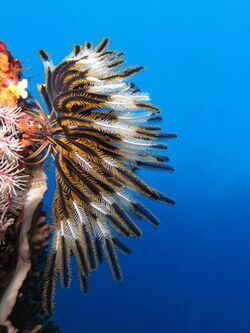Biology:Crinozoa
| Crinozoa | |
|---|---|

| |
| Crinoid on the reef of Batu Moncho Island, Indonesia | |
| Scientific classification | |
| Domain: | Eukaryota |
| Kingdom: | Animalia |
| Phylum: | Echinodermata |
| Subphylum: | Crinozoa Matsumoto 1929 |
| Classes | |
| |
Crinozoa is a subphylum of mostly sessile echinoderms, of which the crinoids, or sea lilies and feather stars, are the only extant members.[1][2] Crinozoans have an extremely extensive fossil history, which may or may not extend into the Precambrian (provided the enigmatic Ediacaran Arkarua can be positively identified as an edrioasteroid).
Classes within Crinozoa
The classes currently contained within Crinozoa include Crinoidea and the extinct Paracrinoidea (Cystoidea, Edrioasteroidea, and Rhombifera).[2]
Regeneration
Since the Paleozoic, sea lilies, or crinoids, have been able to regenerate and undergo arm autotomy or the intentional amputation of a limb. The sea lily can regenerate all of its arms at once in addition to its entire crown. Their stalk's uppermost segment and the basal plates have the capacity to regenerate the entire crown. Nutrients and other components from the stalk, especially the upper 5 cm, are used by crown regeneration.[3]
See also
- List of echinoderm orders
- Blastoids, superficially similar-appearing echinoderms that belong to a different echinoderm subphylum.
References
- ↑ Newton, Alisa L.; Dennis, Michelle M. (2021-03-23), LaDouceur, Elise E.B., ed., "Echinodermata" (in en), Invertebrate Histology (Wiley): pp. 1–18, doi:10.1002/9781119507697.ch1, ISBN 978-1-119-50765-9, https://onlinelibrary.wiley.com/doi/10.1002/9781119507697.ch1, retrieved 2023-08-04
- ↑ 2.0 2.1 "WoRMS - World Register of Marine Species - Crinozoa". https://www.marinespecies.org/aphia.php?p=taxdetails&id=147423.
- ↑ Amemiya, Shonan; Oji, Tatsuo (June 1992). "Regeneration in sea lilies" (in en). Nature 357 (6379): 546-547. doi:10.1038/357546a0. ISSN 1476-4687. https://doi.org/10.1038/357546a0.
Wikidata ☰ Q2503841 entry
 |

